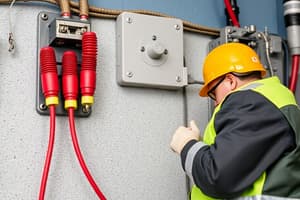Podcast
Questions and Answers
What does electrical safety primarily involve?
What does electrical safety primarily involve?
- Increasing the voltage in electrical systems for higher efficiency.
- Maximizing the use of electricity in all applications.
- Ignoring potential hazards to complete tasks quickly.
- Practices for handling and maintaining electricity-powered equipment to prevent incidents. (correct)
Which of the following is the MOST important initial step to take when working with electrical equipment?
Which of the following is the MOST important initial step to take when working with electrical equipment?
- Wearing rubber gloves and safety glasses.
- Ensuring the equipment is properly grounded.
- De-energizing the equipment and using lockout/tag-out procedures. (correct)
- Checking the voltage level with a voltmeter.
What is the primary purpose of using Personal Protective Equipment (PPE) in electrical work?
What is the primary purpose of using Personal Protective Equipment (PPE) in electrical work?
- To make electrical work look more professional.
- To reduce the cost of insurance for electrical companies.
- To protect workers from potential electrical hazards. (correct)
- To increase the speed and efficiency of electrical tasks.
Why is it important to be cautious of conductive tools and cleaning materials when working with electricity?
Why is it important to be cautious of conductive tools and cleaning materials when working with electricity?
Which of the following is considered an unsafe act when working with electrical equipment?
Which of the following is considered an unsafe act when working with electrical equipment?
According to the provided materials, what is the effect of a current of approximately 50-150 milliamperes passing through the human body?
According to the provided materials, what is the effect of a current of approximately 50-150 milliamperes passing through the human body?
What is the purpose of Lockout/Tag-out procedures
What is the purpose of Lockout/Tag-out procedures
Why should wet working conditions be avoided when working with electricity?
Why should wet working conditions be avoided when working with electricity?
Which of the following is the BEST practice to ensure electrical safety?
Which of the following is the BEST practice to ensure electrical safety?
What is the primary reason why electrical safety training is important for employees?
What is the primary reason why electrical safety training is important for employees?
What does the acronym 'T.A.D.W.A.L' stand for in the context of electrical safety?
What does the acronym 'T.A.D.W.A.L' stand for in the context of electrical safety?
Why is it essential to follow the electrical safety practices of your company?
Why is it essential to follow the electrical safety practices of your company?
What is the MOST likely outcome of ignoring basic electrical safety guidelines?
What is the MOST likely outcome of ignoring basic electrical safety guidelines?
Why is planning a job important for electrical safety?
Why is planning a job important for electrical safety?
What should you do if you discover damaged or frayed electrical cords?
What should you do if you discover damaged or frayed electrical cords?
Which of the following currents is MOST likely to cause cardiac arrest, severe burns, and probable death?
Which of the following currents is MOST likely to cause cardiac arrest, severe burns, and probable death?
What should you do if you see someone in contact with a live electrical wire?
What should you do if you see someone in contact with a live electrical wire?
According to the provided materials, why is it important to avoid overhead power lines?
According to the provided materials, why is it important to avoid overhead power lines?
Which of the following is the MOST effective way to ensure safe use of electrical equipment?
Which of the following is the MOST effective way to ensure safe use of electrical equipment?
What should you ensure when flammable materials are in use?
What should you ensure when flammable materials are in use?
Flashcards
Electrical Safety
Electrical Safety
A general practice of handling and maintaining electricity-powered equipment to prevent incidents.
Lockout/Tag-out
Lockout/Tag-out
Equipment and procedures used to de-energize equipment to prevent unexpected start-up or release of hazardous energy.
Using Improper Tools
Using Improper Tools
Using tools or equipment in a way that is not recommended or safe.
Failing to use proper PPE
Failing to use proper PPE
Signup and view all the flashcards
Operating without Authority
Operating without Authority
Signup and view all the flashcards
Failure to place warning signs
Failure to place warning signs
Signup and view all the flashcards
Safety
Safety
Signup and view all the flashcards
Precaution
Precaution
Signup and view all the flashcards
PPE
PPE
Signup and view all the flashcards
Qualified Personnel
Qualified Personnel
Signup and view all the flashcards
Conductive tools
Conductive tools
Signup and view all the flashcards
Electrical Shock
Electrical Shock
Signup and view all the flashcards
Ventricular fibrillation
Ventricular fibrillation
Signup and view all the flashcards
Avoid live electrical contact
Avoid live electrical contact
Signup and view all the flashcards
Overhead Lines
Overhead Lines
Signup and view all the flashcards
Wet Conditions
Wet Conditions
Signup and view all the flashcards
Study Notes
- Electrical safety is a general practice of handling and maintaining electricity powered equipment to prevent incidents.
Technical Terms
- PPE refers to Personal Protective Device
- Safety is the condition of being protected from unlikely causes of danger, risk or injury.
- Precaution is a measure taken in advance to prevent.
Electrical Safety Tips
- Prevent all potential contact with live electrical current
- De-energize equipment and use Lockout/Tag-out procedures
- Ensure the safe use of electrical equipment
- Install proper physical barriers and safeguards
- Beware of conductive tools and cleaning materials
- Look above for electrical lines when working overhead
- Use extreme caution with flammable materials
- Ensure only qualified personnel work on live electrical wires
- Always adhere to company electrical safety practices
- Electrical shock can be deadly
Unsafe Acts
- Using improper tools and equipment
- Failing to use proper PPE
- Operating without authority
- Neglecting to place warning signs or signals where needed
Effects of Electric Current in the Body
- 1 Milliampere: Perception level, just a faint tingle
- 5 Milliamperes: Slight shock felt; strong involuntary reactions can lead to injuries
- 6-30 Milliamperes: Painful shock; muscular control is lost
- 50-150 Milliamperes: Extreme pain, respiratory arrest, severe muscular contractions; death is possible
- 1,000-4,300 Milliamperes: Ventricular fibrillation, muscular contraction and nerve damage, and death are likely
- 10,000 Milliamperes: Cardiac arrest, severe burns, and probable death
How to Control Electrical Hazards Through Safe Work
- Plan your work and safety measures
- Avoid wet working conditions and other dangers
- Stay clear of overhead power lines
- Use proper wiring and connectors
Importance of Electrical Safety
- Electrical safety is important because mishandled electricity can cause serious injury or death
- Use proper techniques to keep electricians safe at work
T.A.D.W.A.L
- Think
- Avoid Horse Playing
- Don’t Work Alone
- Work with One Hand
- Avoid Alcohol and Drugs
- Learn First Aid
Studying That Suits You
Use AI to generate personalized quizzes and flashcards to suit your learning preferences.




